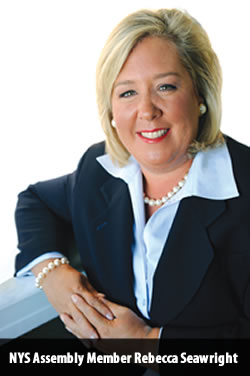GUEST EDITORIAL
No Hidden Figures Allowed
By Rebecca A. Seawright, NYS Assembly Member, 76th District
 Last time, I wrote about our ongoing efforts in the State Legislature to ensure gender equality in our great State of New York. This includes my legislation mandating insurers to cover 3-D mammograms, amending the New York State Constitution to include the Equal Rights Amendment, and my legislation proposing an enduring inventory of women appointments to policy-making boards, commissions, and top level agency positions to be maintained by the Secretary of State. These initiatives and more were advocated in the spirit of Women’s Equality Day on August 26 in the year that marks the 100th anniversary of the women’s suffrage movement. While we can point to many significant gains, the overall progress of women in our society needs more than a big boost. Let’s take the figures out of hiding and examine the record.
Last time, I wrote about our ongoing efforts in the State Legislature to ensure gender equality in our great State of New York. This includes my legislation mandating insurers to cover 3-D mammograms, amending the New York State Constitution to include the Equal Rights Amendment, and my legislation proposing an enduring inventory of women appointments to policy-making boards, commissions, and top level agency positions to be maintained by the Secretary of State. These initiatives and more were advocated in the spirit of Women’s Equality Day on August 26 in the year that marks the 100th anniversary of the women’s suffrage movement. While we can point to many significant gains, the overall progress of women in our society needs more than a big boost. Let’s take the figures out of hiding and examine the record.
Despite the fact that the U.S. ranks number one worldwide in female/male parity in educational attainment, women are far behind in holding positions of power in the professions and business. In academia, women win more than 55% of the most prestigious awards, but hold only 29% of tenured positions. In law, women make up 47% of law school graduates, yet they are far below that percentage in being equity partners and managing partners in law firms. In business, women hold less than 20% of executive positions and Board of Directors seats in Fortune 500 Companies, and the percentage of female Fortune 500 CEOs remains in single digits. This is especially true in the field of technology. The U.S. Department of Labor predicts that between 2010 and 2020 there will be nearly 1.4 million computing-related jobs, and while women hold over half of professional occupations in the country, only 26% of computing occupations are held by women.
The era of Information Technology (IT) has significantly changed how we think, live, communicate and conduct business. It has not only improved the efficiency and productivity at the workplace, but created competitive high-paying salaries and stable jobs that keep overall unemployment rates lower. Yet, women have remained far behind the curve in obtaining senior jobs in the technology industry.
Just the other day, a young woman who recently was graduated from high school and volunteers at my district office, shared a story that truly speaks to the core of the problem that is before us. After taking coding classes every summer, despite her fervid interest in computers and technology, she decided to cancel her enrollment. “I was the only girl in my coding class and in my physics class in my senior year. The boys didn’t let me into their study groups. I am still interested in computer science, but my experience in high school was riddled with sexism,” she added.
While we will continue to fight to pass legislation in our city, state and federal government that will prevent women from being treated as second-class citizens, we must also encourage young women to explore their interests and potential, regardless of the occupational gender stigmas that are embedded in our society. Women should never fear to explore their interests because of sexism. We need educational programs early on in all schools that encourage STEM interest; and we need to identify and help fund programs that work best and bear replication elsewhere. I was proud to partner with the National Foundation for Women Legislators and Google’s Made with Code in their outreach efforts and to provide a free screening of the movie “Hidden Figures” and a coding class at a high school in my district. It is initiatives like these that inspire young women to go past sexism, societal expectations and other norms to achieve their potential to the fullest. #
